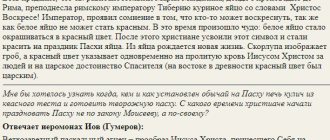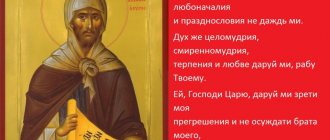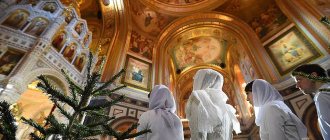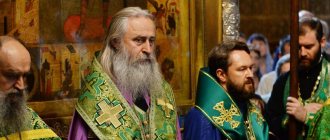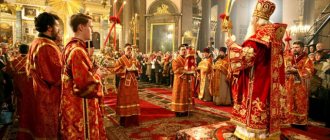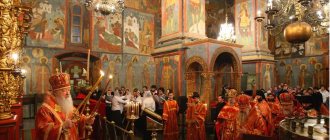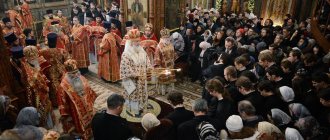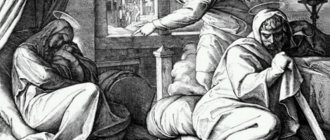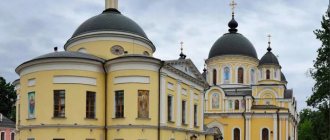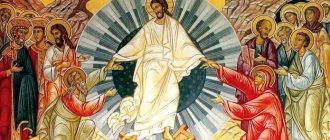Everyday Clock
The Services of the Hours are performed on most days of the year (when other Hours are not celebrated) and are therefore called daily. There are first, third, sixth and ninth hours.
At the first hour we remember the expulsion of Adam and Eve from paradise and the appearance of Christ at the trial of Caiaphas, at the third the descent of the Holy Spirit on the apostles, at the sixth the crucifixion of the Savior, and at the ninth - His death on the cross.
In ancient Israel, the night was divided into four “watches”, and the day, in accordance with the solar circle, into four “hours”, which later, in relation to the generally accepted Roman tradition, were called “first”, “third”, “sixth” and "ninth".
Usually the Hours are performed in the following order: 1st - at the end of the all-night vigil (after Matins); 3rd and 6th - immediately before the Liturgy; The 9th, according to the Charter, should be performed at the beginning of the all-night vigil, before Vespers (in many parish churches it is not performed).
The prayer basis of the Hours is made up of psalms (each - three: 1st hour : Ps.5, 89, 100; 3rd hour : Ps.16, 24, 50; 6th hour : Ps.53, 54, 90 ; 9th hour : Ps.83, 84, 85.), as well as chants of the current day - troparia and kontakion.
The sequences of the Daily Hours are contained in the Book of Hours. Their modified parts: troparia and kontakion - in the Octoechos, Menaion and Triodion.
***
Lenten Hours
The service of the hours performed during Lent has its own characteristics in comparison with the daily (non-Lenten) hours.
a) At each hour, after reading the three prescribed psalms, an ordinary kathisma is read (with the exception of Mondays and Fridays at the first hour and Fridays at the ninth hour; kathismas are also not read at the first and ninth hours on Holy Monday, Tuesday and Wednesday). See the numbers of kathismas here.
b) At each hour the fasting troparion of the hour is sung three times, with prostrations to the ground.
c) At the sixth hour there is a reading of parimia from the book of the prophet Isaiah.
d) At the end of each hour there is a prayer to St. Ephraim the Syrian “Lord and Master of my life...”, with great (earthly) bows.
e) The third, sixth and ninth hours are performed together before the fine ones.
Lenten hours are celebrated on Monday, Tuesday, Wednesday, Thursday and Friday of the entire Holy Pentecost, on Monday, Tuesday and Wednesday of Holy Week, on Wednesday and Friday of Cheese Week (if these days of Cheese Week do not coincide with the feast of the Presentation of the Lord or a temple holiday).
- Full text of the Lenten Hours of the Lenten Triodion
- Observance of the Lenten Hours Handbook of the priest
- Lenten Hours Liturgical Instructions
***
Great (Royal) Clock
Three times a year, special rites of the Hours are established, which in liturgical books are called Great, and among the people - Royal. They were compiled by Cyril of Alexandria (IV century, Egypt) and consist of different psalms than the usual hours:
The Royal Hours are celebrated on Christmas Eve (i.e. on the eve) of the holidays of the Nativity of Christ and the Epiphany (January 6 and 18), and are dedicated to these sacred events, as well as on Good Friday (the moving date of Holy Week) - for the sake of the Passion of the Lord.
The popular name comes from the ancient tradition of Byzantium: the emperor and his court were present at this clock in the cathedral. Russia adopted the traditions of church services from Byzantium, and our noble sovereigns strictly followed this rule.
The royal hours are celebrated with the royal doors open, in the middle of the temple, in front of the Gospel placed on the lectern.
At each Hour, psalms are read (three at each): 1st hour : Ps.5, 2, 21; 3rd hour : Ps.34, 108, 50; 6th hour : Ps.53, 139, 90; 9th hour : Ps.68, 69, 85.
In addition to the psalms, at each hour (and they are performed in a row, from the first to the ninth), a parimia is read - a passage from the Old Testament, containing a prophecy about the remembered day, a text from the Apostle and the Gospel. In addition, special troparia are sung.
If any of the Christmas Eves falls on Saturday or Sunday, then the royal hours are moved to the previous Friday, and there is no liturgy on that day. There are no pious sovereigns in Russia now, but the royal watches do not cease to be so. After all, the Heavenly King is present in churches with His grace. Let us not forget about the Great Hours, for it is from them that the celebration of Christmas and Epiphany begins, and they precede Easter on Good Friday.
- Consequence of the Royal Hours of Christmas Eve Menaion
- Consequence of the Royal Hours of Epiphany Christmas Eve Menaion
- Consequence of the Royal Hours of Good Friday Lenten Triodion
- Royal Clock of the Eve of the Nativity of Christ with interpretation
***
Important changes: home prayers for Holy Week and preparation for Communion
Holy Easter of Christ is the greatest holiday in the life of any Christian. It is not surprising that, for some time, it changes our entire way of life. In particular, the home prayers of Bright Week differ from the usual ones. The order of preparation of a layman for Communion is changing. From the evening of the first Saturday after Easter until the feast of Trinity, some of the usual elements of morning and evening prayers also change.
Home prayers for Holy Week
So, let's look at how the home prayers of Bright Week are changing and how they differ from those we are used to. I admit that my page can be read by people who are just joining the church, and I will start with a small introduction.
One of the important moments of a Christian’s church life is the daily home (so-called “cell”) reading of morning and evening prayers.
This can be compared to the “good morning” and “good night” that loving children say to their parents in the morning and when going to bed.
Morning and evening prayers are a set of prayers composed by various saints, which the Church recommends as containing the most necessary for every Orthodox doxology and petition to God, the Mother of God and the saints for the day and the coming night.
From the Feast of Easter to the Feast of Trinity, home prayers are modified in order to express respect for the holy holiday during Bright Week and then to show the believer's understanding of the main biblical events that followed it.
The most important change that a believer needs to know about: on all days of Easter Week (Bright Week) - the first week after the Feast of the Resurrection of Christ, until Saturday morning inclusive - evening and morning prayers are not read at home . Instead, the Easter Hours are sung or read. They can be found in large prayer books and canonical prayer books.
Also, any other home prayers of Bright Week - canons, akathists, etc. must be preceded by three readings of the Easter troparion:
“Christ is risen from the dead, trampling down death by death, and giving life to those in the tombs.”
Psalms and prayers, usual for home prayers when reading canons and akathists from the Trisagion to “Our Father” (with troparia after it), are not read.
Instead of the prayer “It is worthy to eat,” which usually completes the reading of any prayer rules, the so-called “zadostoynik” (see below).
The Hours of Easter are also sung instead of Compline and Midnight Office.
During Bright Week, Christians at home do not read the Psalter or any penitential prayer rules.
From the day of Holy Easter to the day of the Holy Trinity, prostrations to the ground are canceled . You can read more about bowing here.
Preparation for Communion on Bright Week
If a Christian spent Great Lent in abstinence and prayer, then on Bright Week he can begin Communion on an empty stomach (that is, without taking food or water since midnight), but without fasting the day before. Of course, a reservation should be made that before Communion and breaking the fast is permission, at the end of the fast, to eat fast food, which is prohibited during fasting, in moderation, without overeating and without indulging in drunkenness or smoking tobacco.
The home prayers of Bright Week, which make up the rule for Holy Communion, are changed in this way: instead of the three canons (Repentant, Theotokos and Guardian Angel), the Canon of Easter is read, then the Easter Hours, the Canon for Communion with prayers.
As mentioned above, all prayers, including prayers of thanks for Holy Communion, are preceded by three readings of the Easter troparion, and psalms and prayers from the Trisagion to “Our Father” (with troparions after it) are not read.
As for confession before Communion: if you confessed during Holy Week and did not commit serious sins, then the need for confession immediately before Communion is best determined with the priest of the church where you want to receive communion or with your confessor.
Home prayers for the second week of Easter and until Trinity
From the second week after Easter (the evening of the first Saturday), the reading of the usual morning and evening prayers is resumed, as well as the Rules for Holy Communion, including the canons to the Lord Jesus Christ, the Most Holy Theotokos, the Guardian Angel and the Follow-up to Holy Communion.
However, it is necessary to pay attention to the following features: before the Feast of the Ascension of the Lord (40th day after Easter), on the eve of which the Easter holiday is celebrated, instead of praying to the Holy Spirit “Heavenly King,” the Easter troparion “Christ is risen from the dead” is read three times.
From the Ascension to the Feast of the Holy Trinity (50th day), prayers begin with the Trisagion “Holy God,” the prayer to the Holy Spirit “Heavenly King” is not read or sung until the Feast of the Holy Trinity.
I remind you once again that before the day of the Holy Trinity, prostrations to the ground are canceled not only at home, but also in the Temple, in particular - to the exclamation “Holy to the Saints” and when taking out the Holy Chalice.
Zadostoynik
From Monday of Bright Week until Ascension, instead of the usual ending of the prayers, “It is worthy to eat,” the worthy man is sung:
“The angel cried out with grace: Pure Virgin, rejoice! And again the river: Rejoice! Your Son is risen three days from the grave and raised up the dead; people, have fun!
THIS IS INTERESTING: Who was the first to adopt Christianity in Rus'
Shine, shine, new Jerusalem, for the glory of the Lord is upon you. Rejoice now and be glad, O Zion. You, Pure One, show off, O Mother of God, about the rising of Your Nativity.”
Based on materials from the sites azbyka.ru and foma.ru
Do you see a mistake in this article? Please highlight it and press Shift + Enter or click here to let me know about it.
Source: https://avva.org.ua/poleznoe/molitvy/izmenenie-molitv-na-paskhu/
Easter clock
The Easter Hours are part of the Easter Day service (consisting of Matins, Easter Hours, Liturgy and Vespers).
On the days of Bright (Easter) Week, they are sung in church instead of reading the Daily Hours, Compline and Midnight Office. They also replace the morning and evening prayer rules.
The Easter Hours do not have variable prayers and do not contain psalms.
- Easter clock Text and video
- Audio. Easter hours
What prayers should be read when entering the temple?
Before entering the temple you need to cross yourself and bow three times. ... After each crossing, a prayer is read.
- God, be merciful to me, a sinner. - Bow.
- God, cleanse me, a sinner, and have mercy on me. - Bow.
- Who created me, Lord, forgive me! - Bow.
Interesting materials:
Do I need to wash off the Splash mask? Do I need to create an EFI partition? Should I put a comma before the word According? Do I need to learn irregular verbs? Do I need to study to become a sales consultant? Do I need to study to become a tour operator? Do I need to wash my face after using sheet masks? Do I need to cite sources in my report? Is it necessary to maintain a cash book for the online cash register of the Republic of Kazakhstan? Is it necessary to soak a goose?

